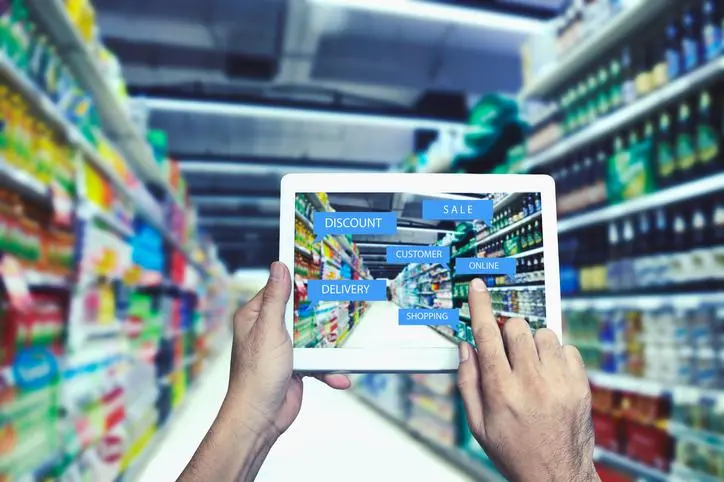PHOTO
The UAE's online grocery delivery market is currently positioned in a growth stage registering a double-digit growth rate close to 38% between 2016 and 2019, according to a report by Ken Research.
High internet penetration, rising working population and an increasing number of single families has led to the growth of e-grocery services in UAE, stated the report.
The number of companies offering grocery delivery services in the UAE too has increased over the years, it added.
The demand is expected to grow with a CAGR of 34% on the basis of GMV between 2019 and 2025. Companies are anticipated to focus on expanding tie-ups with suppliers & grocery stores to fulfill customer orders, according to Ken Research.
The demand is expected to be driven by upcoming technologies such as drone delivery, warehouse automation, voice ordering and others.
Market consolidation is expected in the future as players with the heavy financial backing and better brand value will acquire small players, stated the report.
Gaps in offline grocery shopping such as the inconvenience of commute, long payment queues and cost of impulse buying had led to the introduction of e-grocery delivery in UAE, mainly driven by the teens and also those in the 25 to 44 age group, considered an influential customer base for online grocery shopping.
Buoyed by the demand, the e-retail companies have expanded their product portfolios from food & beverages to household supplies, baby food, fresh food, fish & meat, and other product categories, stated Ken Research in the report.
Various aspects including the current online grocery delivery scenario in UAE, need and opportunities describing the target addressable market, addressable the gap in the market, and possible solutions have been covered in the report.
It also highlights the current supply and demand in the region, detailed working of marketplace, omnichannel and pureplay operating model, trends, developments, challenges, seasonality trends, current & upcoming technologies facilitating online grocery delivery industry, revenue streams and marketing strategies driving the industry.
It also gives a detailed explanation of competitive scenario including cross-comparison between major players, SWOT, and detailed company profiles of major players and concluding with future scope and analyst recommendations.
According to Ken Research, F&B dominated the most-in-demand product list followed by household supplies, beauty & health, baby & kids, and fresh food.
Carrefour emerged the most favourite retailer in the F&B category in the UAE followed by Lulu Hypermarket, Bawiq, El Grocer and Talabat.
Dubai and Abu Dhabi were the cities driving the online grocery services demand. This was mainly due to the concentration of the population in
these regions.
Working professionals, who are the major end-users of online grocery delivery services, are concentrated in Dubai and Abu Dhabi, stated the report.
The demand is still dominated by pre-delivery online payment followed by card on delivery and cash on delivery. People who order online are usually not present to collect delivery and therefore pre-payment is preferred.
In Dubai and Abu Dhabi majority of household chores are taken care of by house helps and they usually collect the order delivery therefore customer prefers online mode of payment.
The industry is fragmented with the presence of more than 25 players operating across the marketplace, pureplay and omnichannel model.
Delivery cost, delivery time, app interface, discounts and offers, return policy, ease of payment have been major factors influencing customer behavior.
The major players include Carrefour, Instashop, Lulu Hypermarket, El Grocer, Kibsons, Bulkwhiz, and Bawiq. Companies with large product assortment, wide regional presence, and express delivery are identified as clear leaders in the industry, said the report.
Service providers have been following marketplace, Pureplay and Omnichannel model to deliver customer orders in UAE.
Instashop, Bawiq, El Grocer has been following marketplace model in UAE. Kibsons, Bawiq, Noon, Amazon follows the pureplay model. Whereas Carrefour, Lulu Hypermarket, Aswaaq, Choithrams follows the Omnichannel model.
Online grocery sales in the region have surged recently, as more people are avoiding crowded places and turning to online shopping owing to the corona pandemic.
The average basket size of online order has increased to 15-20 times during the corona pandemic. Average delivery time for Omnichannel companies during the pandemic increased to 8-10 days, said the report.
On the other hand, pureplay and marketplace companies were offering grocery delivery within 2-4 days and one day respectively, it added.-TradeArabia News Service
Copyright 2020 Al Hilal Publishing and Marketing Group Provided by SyndiGate Media Inc. (Syndigate.info).
Disclaimer: The content of this article is syndicated or provided to this website from an external third party provider. We are not responsible for, and do not control, such external websites, entities, applications or media publishers. The body of the text is provided on an “as is” and “as available” basis and has not been edited in any way. Neither we nor our affiliates guarantee the accuracy of or endorse the views or opinions expressed in this article. Read our full disclaimer policy here.





















